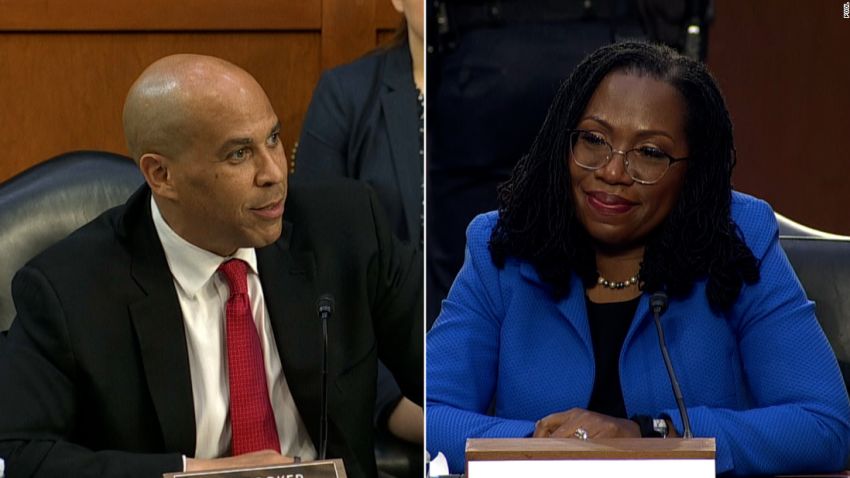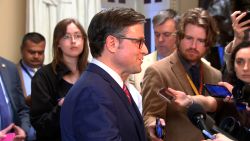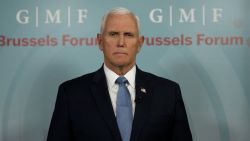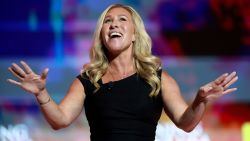Two news stories dominated the headlines this week. The ongoing Russian invasion of Ukraine reached its one month mark. And the Senate hosted confirmation hearings for Judge Ketanji Brown Jackson to join the Supreme Court.
It’s with the Jackson confirmation hearings that we begin our statistical journey into the news of the week.
Jackson in the court of popular opinion
Five recent surveys have indicated strong support for President Joe Biden’s decision to nominate Jackson for the Supreme Court seat retiring Justice Stephen Breyer is vacating. According to an average of polls by Gallup, Fox, Monmouth University, Quinnipiac University and the Pew Research Center, about 53% of Americans supported her confirmation, with about 26% of Americans opposed. This is good for a +27-point net popularity rating.
If Jackson’s ratings hold up through her likely confirmation, she would be the most popular nominee to be confirmed since John Roberts in 2005. Jackson’s popularity should only help her in the confirmation process.
A few years ago, I built a statistical model to help understand why senators vote the way they do on Supreme Court nominees. The model took into account variables such as a nominee’s qualifications, the ideology of the nominee and the senator, etc.
One of the factors I included was public sentiment about a nominee. Holding everything else equal, nominees got more votes when they were more popular with the public. Clarence Thomas, for example, was generally viewed in 1991 as very conservative and not as well qualified as many earlier nominees. Yet, Thomas was confirmed by a Democratic-controlled Senate.
A lot of that may have had to do with the fact that he was popular. Thomas had a +33-point net popularity rating among Americans, according to an average of polling taken before he was confirmed.
Jackson could join Roberts as the only Supreme Court nominees this century to achieve a popularity level anywhere near where Thomas was some 30 years ago.
Indeed, one of the big stories of Supreme Court nominations this century is how divisive they’ve generally been with the American public. Since 2005, nominees who either got a Senate vote or withdrew their nominations averaged only a +10-point net popularity rating in their final polls.
Compare that with nominees from 1986 to 1994, who averaged a +26-point net popularity rating in their final polls before their Senate vote or withdrawal of their nomination.
This strong popularity for earlier nominees helps, at least in small part, to explain why most of them flew through their confirmation hearings and why many this century have generally had a harder time.
Of course, we probably shouldn’t expect Jackson to get anywhere near the number of votes Roberts got from senators (78). The Senate has grown more polarized in general, with senators less likely to cross the aisle over the last 30 years – more so over the last 15 to 20 years. That’s another big reason why even confirmed Supreme Court nominees are getting fewer “yes” votes than they used to.
Still, it would be surprising if Jackson didn’t get at least a few Republican votes. Sens. Susan Collins of Maine, Lisa Murkowski of Alaska and Rob Portman of Ohio seem the most likely given how often they’ve voted with Biden this Congress.
The good news for Democrats is that even if Jackson doesn’t get any Republican votes, the polarization would still help her. It is unlikely that any Democrat will vote against her. With the Senate Democratic Caucus controlling 50 seats and Vice President Kamala Harris breaking any tie votes, all Jackson needs for confirmation is Democratic support.
Don’t forget about the economy
The Jackson confirmation hearings and the Russian invasion of the Ukraine are basically all you see on cable tv right now. From Monday through Wednesday this week, there were over 4,300 mentions of “Ukraine” and over 1,400 mentions of “Supreme Court” across CNN, Fox News and MSNBC, per the Internet Archive’s Television News Archive.
There were just 220 mentions of inflation by comparison.
Yet, that’s what voters care the most about. In a CBS News/YouGov poll from earlier this month, 46% said the “economy and jobs” or “inflation” were the most important issues facing the country. No other issue came close.
This could explain why there’s been a minimal “rally around the flag” effect for Biden following the Russian invasion of Ukraine. While the President’s approval rating seemed to rise by a point or two initially, any rise has since flattened out. Biden’s average approval rating stands in the low 40s with a disapproval rating in the mid 50s.
Notably, Biden’s approval rating on the economy has been stuck in the high 30s with little sign of movement over the past month. In contrast, his approval rating on the Russia-Ukraine situation has risen over the past month. This rise has had little impact on his overall approval rating.
The importance of the economy to voters has been clear throughout Biden’s term so far. His overall approval ratings have tracked closely with his ratings on the economy, which have ranged from the high 50s to the upper 30s.
The fact that the economy has remained important to determining the temperature of the electorate shouldn’t be surprising. Even with a global pandemic, the 2020 election result tracked well with what would have been expected with a lackluster, though not awful, economy.
It’s a reminder that what dominates the airwaves doesn’t necessarily dominate the minds on Main Street.
For your brief encounters: Did you know the Academy Awards are on Sunday night?
I asked two friends whether they would be watching the Oscars this weekend. Neither knew it was actually on. I can’t say I’m shocked. While more than 40 million people watched the Academy Awards in 2014, viewership has been on decline in recent years. About 10 million people watched last year.
I covered this and other statistics about the Oscars (including who is favored to win) in a recent article. Check it out if you, like my friends, aren’t up to snuff on what was once a cultural touchstone.
Last week’s results: I asked you all what you were more looking forward to watching – the NCAA basketball tournament or the start of the Major League Baseball season?
A plurality of respondents were more into the NCAA tourney. – though the comments in support didn’t exactly represent a ringing endorsement for the most part. “I really don’t care much about college ball, but as a reds fan, I care about baseball that much less,” @its_kduff said.
There were some baseball backers as well. Here’s what @DillonRae96 had to say: “Personally MLB season, grew up in Tucson so the college basketball culture was absolutely shoved in your face at every turn.”
Of course, a few of you fell into neither camp. Like soccer fan @srneal3, who noted, “The MLS and NWSL seasons just started.”
Leftover polls
In-person worship services: A new poll from the Pew Research Center showed that 43% of those who attend religious services once a month said the house of worship they attend most often is open the same way it was before the coronavirus pandemic. In March 2021, it was just 12%.
Early midterm poll accuracy: A review of gubernatorial and Senate polls since 1998 by FiveThirtyEight has a mixed bag of news of those hoping to forecast the future. While either side has about an equal chance of winning races that are polling within 5 points at this stage of the cycle, the side that is ahead wins about 75% of races when they are up 5 to 10 points and about 90% of races when they have a lead of 10 points or more.
Helping others: A Gallup study found strong growth across the world in people helping strangers, volunteering time to organizations and donating money to charities over the course of the pandemic, with participation in such activities increasing by nearly 25%.


















